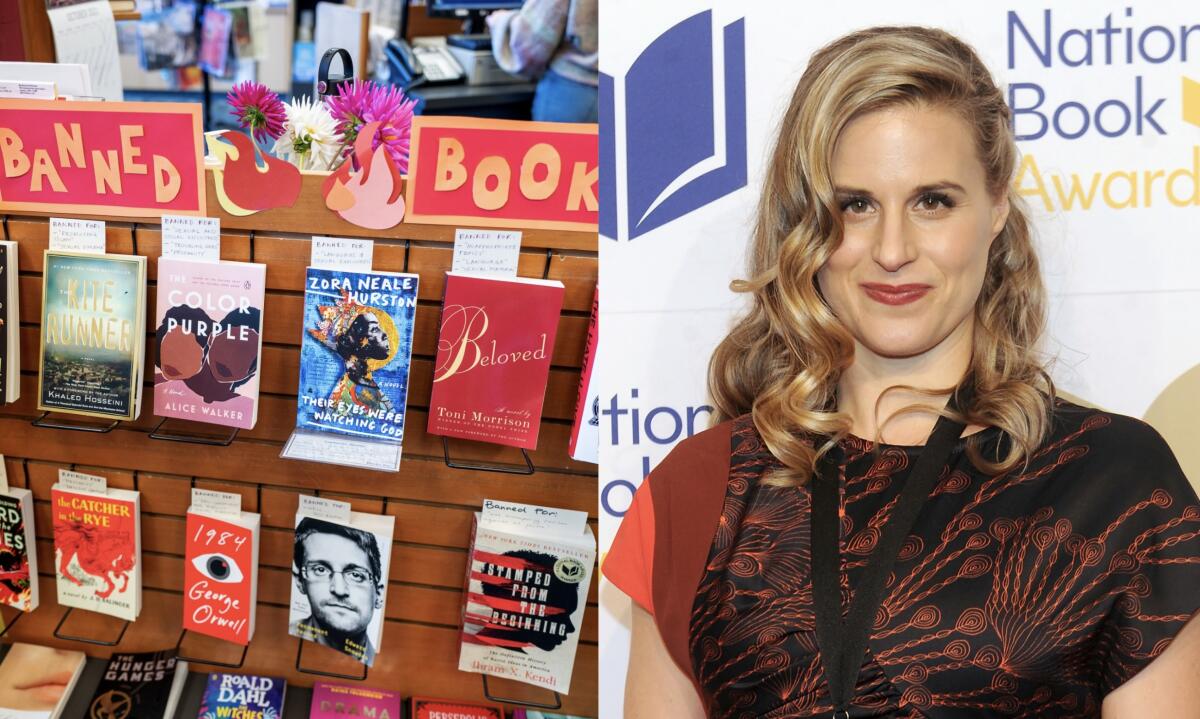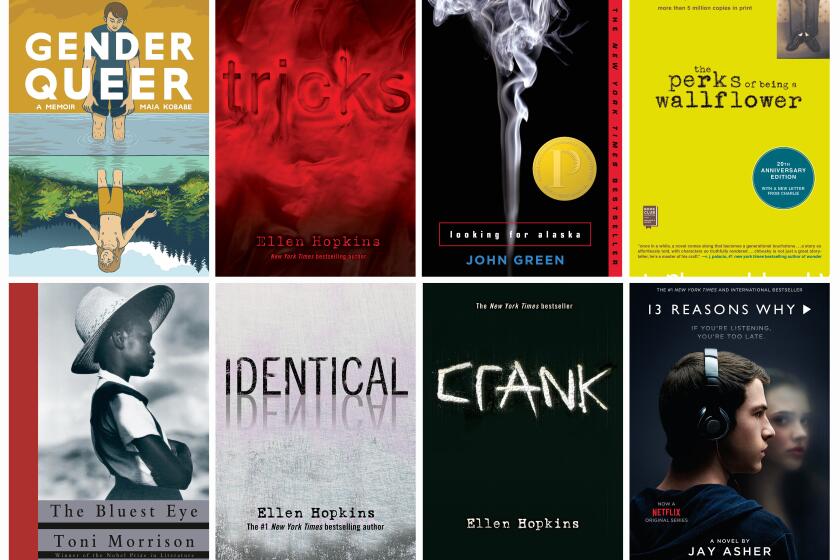A new report shows how corrosive book banning is. Novelist Lauren Groff is fighting back

- Share via
As a new report from PEN America aggregates two years of data on book bans to show how they stigmatize specific authors, Lauren Groff — author of “Florida” and the recent novel “The Vaster Wilds” — has just announced plans to open a bookstore selling frequently banned books in the epicenter of challenged literature. “I love bookstores because I think they, and libraries, are at the forefront of democracy in some very real ways,” Groff told The Times during a phone interview from her home in Gainesville, Fla., on Thursday — the day PEN America released its report.
The new report reflects on the 5,894 book bans in U.S. public schools documented from July 2021 to June 2023. PEN America’s findings illustrated the way copycat bans have become a driving force in the campaign to scrub library shelves. The free-speech advocacy organization also defined what it called the “Scarlet Letter” effect — the stigma attached to authors of challenged books who subsequently found themselves targeted for all their work. As of September 2023, according to PEN, more than 40% of book restrictions occurred in Florida.
Over the 2021-22 and 2022-23 school years, according to PEN, book challenges in public schools affected 247 school districts across 41 states, affecting millions of students. Many of them have recently taken a stand against restricting their literary pursuits.
Book bans spanning the last two school years affected 2,823 unique titles, censoring the works of 2,076 authors, 517 illustrators and 31 translators, according to PEN. In sum, 2,598 creators have been restricted in various ways.
According to PEN America’s annual book-banning report, restrictions on books have increased 33% since last year, but students offer a glimmer of hope.
PEN tracked four types of school book bans: bans from school libraries; bans from classrooms; bans from both libraries and classrooms; and bans pending investigation. For the most severe category of ban (books banned from libraries and classrooms), a book is made inaccessible indefinitely. In the first school year, 333 bans (13% of all bans that year) fell under this category; in 2022-23, this increased to 1,263 bans or 38%.
“Literature is vital to educate young people,” said Sabrina Baeta, of PEN America’s Freedom to Read program, in a statement accompanying the report. “Without literary works, students are left without context for their own experiences, without empathy for the experiences of others, and without a full understanding of the world we live in and the past. We are continually alarmed to see how the movement to ban books has intensified since 2021 and puts at risk the freedoms to read and learn, all the while threatening core principles of education.”
Although the definition of a “book ban” has been disputed, with some arguing that restricting a book’s library access is not tantamount to a ban, PEN America defines a ban as any action taken against a book based on its content. This applies to literature challenged as a result of parent or community actions or administrative decisions, or in response to direct or threatened action by lawmakers or other governmental officials.
PEN America’s report highlighted the “copycat” bans, using the work of Sarah J. Maas as an example. In the 2021-22 school year, the author’s work was banned 18 times across 10 districts, but in 2022-23, that exploded to 158 bans across 36 districts — a 778% increase. Parent- or community-led advocacy groups, such as Moms for Liberty, Parents’ Rights in Education and Citizens Defending Freedom, campaign for book removal through school board meetings and challenge forms, organizing on social media platforms and empowering individual “serial book challengers” who sometimes question more than 100 titles.
The report also found that several authors had experienced a “Scarlet Letter” effect, using Maas again as an example: In the 2021-22 school year, eight of her titles were banned. That doubled to 16 titles in 2022-23. According to PEN America, the works of bestselling authors Ellen Hopkins, Jodi Picoult, Alice Oseman, Laurie Halse Anderson and Rupi Kaur have experienced the “Scarlet Letter” of book-banning campaigns.
Banning books is about restricting ideas. It’s heartening to see some public leaders and others challenge whether these bans are constitutional.
Groff, a bestselling author and three-time National Book Award finalist, has not had her books challenged — but as a Floridian she considers herself to be on the front lines. Groff and her husband, Clay Kallman, plan to open a bookshop, the Lynx, in downtown Gainesville next spring. The store will sell books for all ages, with a specialized focus on titles currently banned in Florida.
“We’ve been dreaming about this as sort of a pipe dream for a really long time,” Groff told The Times. She and Kallman moved to Gainesville in 2006. Kallman has strong roots in the area and essentially grew up in his grandfather’s Gainesville bookstore, which opened in 1933.
It was the rise of book bans on the strength of laws passed under Florida Gov. Ron DeSantis that provided the push the couple needed. “When Florida — which is a state for which I have a great number of ambivalent feelings like profound love, and some real frustration — started to go in an authoritarian direction ... we just decided that now is the time to make the thing we’ve been dreaming about into something real,” Groff told The Times. (Her plans for the Lynx were first reported in Shelf Awareness.)
Groff explained the pressing need to promote the work of LGBTQ+ and BIPOC authors — those disproportionately targeted by book restrictions. Through the Lynx, Groff and Kallman say they aim to platform the ideas of these authors during an era in which the state is actively working to suppress them.
She plans to highlight Florida authors including Zora Neale Hurston, Edwidge Danticat, Jeff VanderMeer, Karen Russell, Kelly Link, Laura van den Berg and Marjorie Kinnan Rawlings.
Groff and Kallman are searching for a general manager for the Lynx. Groff told Shelf Awareness she expected to do much of the heavy lifting in the shop’s first year but envisioned a future when the store’s booksellers would have a stake in the financial success and could benefit from a profit-sharing model.
More to Read
Sign up for our Book Club newsletter
Get the latest news, events and more from the Los Angeles Times Book Club, and help us get L.A. reading and talking.
You may occasionally receive promotional content from the Los Angeles Times.












